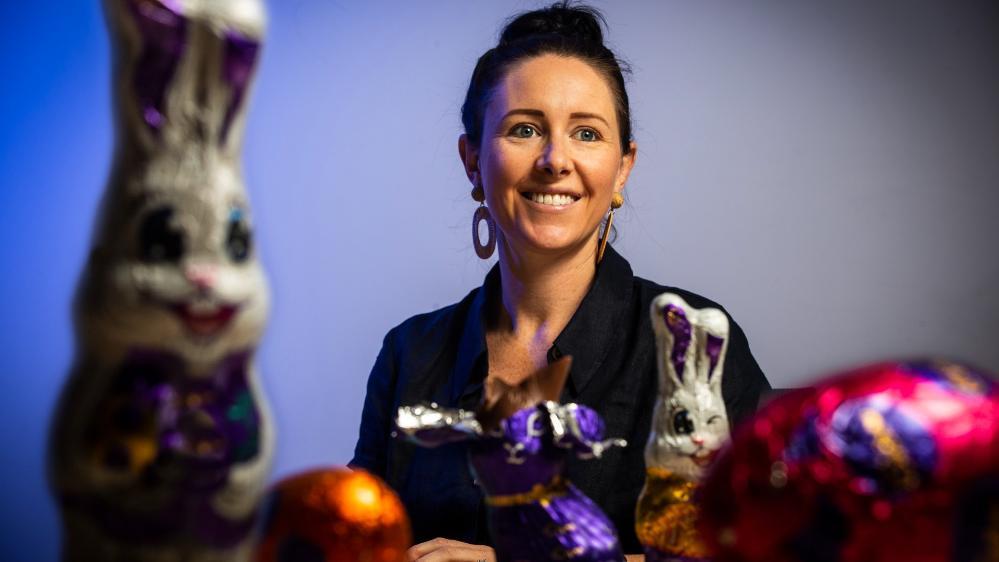April 8, 2022
Why your love of chocolate could be bittersweet
Annual chocolate scorecard highlights the best, and worst, of the global cocoa industry
What really goes in to making your chocolate? There is no food more universally beloved, more ingrained in our culture than chocolate. But the reality is, many chocolate brands engage in practices that are not so sweet. Actually, they can be quite sticky.
The Chocolate Scorecard, an initiative spearheaded by an international team of non-profit organisations and academics, including Dr Stephanie Perkiss from the University of Wollongong (UOW), aims to shine a spotlight on what, exactly, consumers are getting when they purchase their favourite chocolate.
Released just in time for Easter, The Chocolate Scorecard evaluates 38 global chocolate manufacturers against six markers: Traceability and Transparency, Living Income, Child Labour, Deforestation and Climate, Agroforestry, and Agri-Chemical Management.
Beyond Good, a Brooklyn-based chocolate company that sources its cocoa from Madagascar, received top honours on The Chocolate Scorecard this year, alongside Alter Eco, an American company, Dutch manufacturer Tony’s Chocolonely and New Zealand-based Whittaker’s.
Most of the world’s chocolate is produced from cocoa sourced in West Africa, particularly the Côte d’Ivoire and Ghana.
Dr Perkiss, a Senior Lecturer in Accounting from UOW’s Faculty of Business and Law, said The Chocolate Scorecard shone a light on the practices, both good and bad, that take place between harvesting the cocoa beans and buying a bar of chocolate from your local supermarket.
The team, led by Australian charity Be Slavery Free, reached out to chocolate manufacturers around the world to contribute to the scorecard through a combination of surveys, interviews and self-reporting.
“Demand for chocolate has never been greater. As a collective, it is one of our favourite foods, and it’s also associated with so many of our memories and traditions: chocolate on Valentine’s Day, at Easter, chocolates to say thank you and to let someone know you are thinking of them. Chocolate is our modern love drug,” Dr Perkiss said.
“But most consumers don’t consider the cocoa supply chain that leads to them enjoying their favourite chocolate. This can include exposure to child labour and exploitation, ensuring cocoa farmers are receiving a living income, deforestation, and the use of agrichemicals.”

Since The Chocolate Scorecard was first introduced five years ago, the focus on transparency and the international spotlight on these practices has led to change in the industry. Fuzz Kitto, Co-Director of Be Slavery Free, said the campaign has had a tangible impact on communities and the cocoa supply chain.
“The cocoa industry is a real concern in the fight to end modern slavery,” Mr Kitto said. “But this campaign is enabling change. Chocolate manufacturers tell us this scorecard is having an impact on their strategic direction.
“This scorecard is helping to address the issue of child labour and slavery in the cocoa industry. This campaign asks companies to ensure farmers in their supply chains receive a living income. It means children will be going to school because they don’t have to work on cocoa farms. We are seeing processes being improved, an end to deforestation and the beginning of a switch to sustainable practices, which, ultimately, will improve productivity.”
However, there is still a way to go to ensure good practices are ingrained within the cocoa industry and companies are transparent about their practices and supply chains.
“The Chocolate Scorecard is making a real difference on the ground, but it requires business, civil society, academics, farmers and governments working together to solve this wicked problem,” Mr Kitto said.
Dr Perkiss, who specialises in examining social and environmental issues through an accounting lens, said The Chocolate Scorecard highlights the chocolate manufacturers who need to do better, but also those who are engaging in good practices and making a significant impact in addressing issues within their manufacturing process and supply chains.
“In response to the problems, Nestlé expects to source over 14 million tons of its ingredients through regenerative agriculture by 2030, boosting demand for such goods. Nestlé is also scaling up its reforestation program to plant 20 million trees every year for the next 10 years in the areas where it sources ingredients.
“Ferrero has achieved its commitment to source 100% certified cocoa beans by 2020. Mars supported 19,172 farmers in applied agroforestry techniques and had 913,513 multi-purpose trees distributed for on-farm planting (1.4 million since 2018). These are just some examples of positive change,” Dr Perkiss said.
“While being aware of where your chocolate comes from is really important to keep in mind this Easter, issues of sustainability and slavery are year-round. As consumers, we can affect change by supporting chocolate manufacturers engaging in best practice.”
The team behind The Chocolate Scorecard includes researchers Fuzz Kitto and Carolyn Kitto from Be Slavery Free, Etelle Higonnet from the National Wildlife Federation, Dr John Dumay from Macquarie University, Dr Stephanie Perkiss and Dr Cristiana Bernadi from The Open University in the United Kingdom, along with a team of subject matter consultants and civil society groups – a total of 30 organisations.
